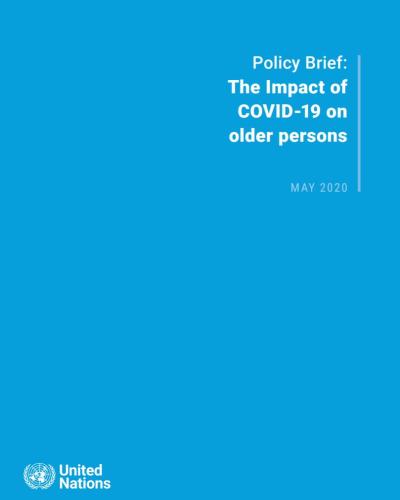Policy Brief: The Impact of COVID-19 on older persons

The COVID-19 pandemic is causing untold fear and suffering for older people across the world.
While the pandemic affects all populations and all age groups, available evidence indicates that older persons are at particularly high risk. The threat to older persons in developing countries is enormous, as public services like health care and social protection will likely be overwhelmed by the virus.
The crisis is exacerbating existing human rights protection gaps and socio-economic challenges for older persons, such as discrimination based on older age, lack of social protection and access to health services, lack of autonomy and participation in decision-making, and freedom from violence, neglect and abuse; lack of legal protection frameworks at the national and international levels.
At the same time, older people contribute immeasurably to their families and communities in various roles, and commonly sacrifice their own well-being as care workers or in helping children and grandchildren. Our COVID-19 response must be cognizant of all of these matters.
The situation of older persons in the face of COVID-19
- Older persons are at higher risk for serious infection and mortality.
- Older persons sometimes face age discrimination in decisions on medical care, triage, and life-saving therapies.
- Older persons, frequently women, are among the care-givers responding to the pandemic and facing higher risk of exposure to the virus.
- Older persons living in long-term care facilities are at a higher risk for adverse outcomes and for infection due to living in close proximity with others.
- Older persons who are quarantined or locked down with family members or caregivers face higher risks of domestic violence.
- Older persons may suffer greater consequences from isolation and lack of access to necessary services as well as digital connectivity.
- Older persons who normally receive care at home and in the community are disproportionately affected by physical distancing measures and shortage of care workers.
- Older persons living in precarious conditions – such as refugee camps, informal settlements and prisons – are particularly at risk of the worst impacts of the disease, due to overcrowded conditions, limited access to health services, water and sanitation facilities.
- Older persons, and especially older women, will be disproportionately harmed by the economic and social impacts of the pandemic, as many will lose their jobs, their pensions, and given social protection system gaps across the world, could fall into poverty.
Essential Policy Responses
- No person, young or old, is expendable. We must address the impact on health and long-term care services for older persons by recognizing health care as a human right and confronting the particular challenges faced by older persons (including age discrimination) in accessing equal medical treatment and care.
- We are one community and we must all support each other. We must strengthen social inclusion during physical distancing, recognizing that restrictions on freedom of movement and physical distancing can lead to a disruption of essential care and support for older persons.
- All social, economic and humanitarian responses must take the needs of older people fully into account. This is particularly the case in terms of universal health coverage, pensions, jobs and social protection.
- Let’s not treat older people as invisible or powerless. We must recognize the diversity of experiences among older persons, and the multiple ways that they are contributing to overcoming this crisis. We must support their agency and ensure their participation and is the design and implementation of those responses. We must harness knowledge and data, share good practices, and expand participation of older people in the response and recovery.
- As we work to recover better, we must tackle the long-standing protection and socio-economic gaps that have left older persons vulnerable in this crisis. We must adopt the appropriate legislation at the national level, move forward toward an international convention on the human rights of older persons at the global level, and invest sustainably in health, care and social protection systems that are ensuring the dignity and right of older persons.




















